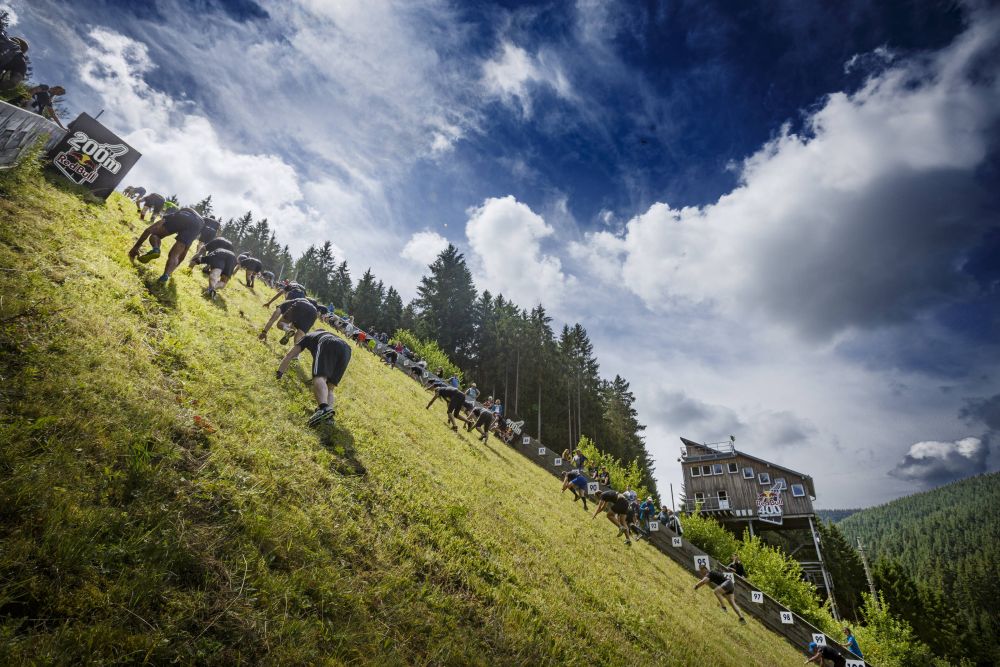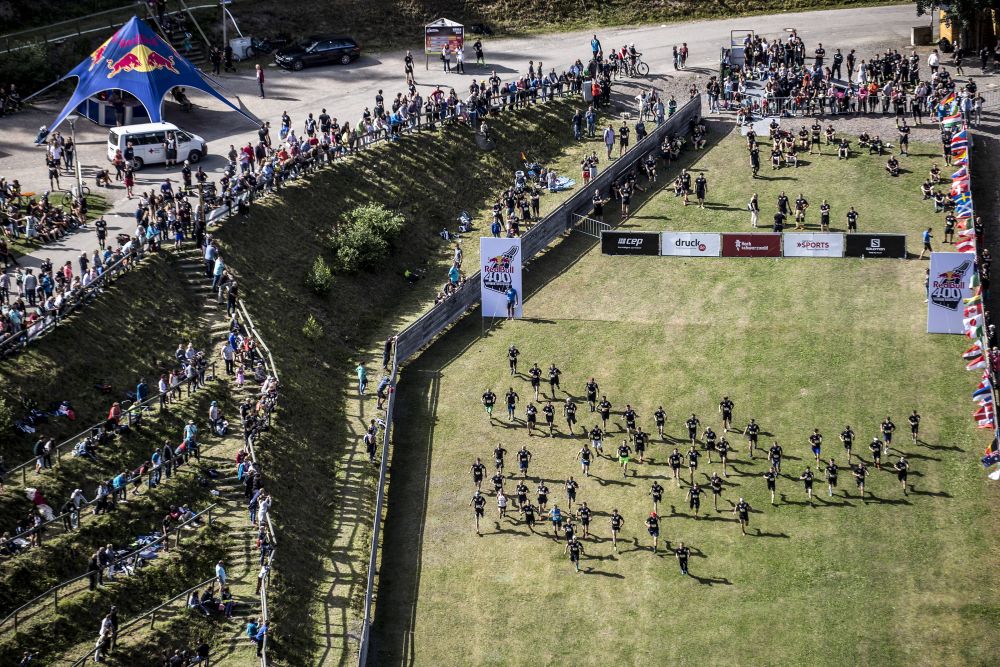Rachel McBride doesn’t shy away from a challenge. The Vancouver-based triathlete and avid endurance athlete possesses a confidence that most athletes should hope for. Chatting from her home on Canada’s west coast, both her self assurance and friendly personality come through. It’s exactly these traits that make you root for her as she prepares to run what’s quite likely the world’s steepest 400m: the Red Bull 400. It’s a straight shoot up the ski jump in Whistler which tortures the quad muscles with a fiery burn all the way to the top. McBride will do it just a week after competing in an Ironman too. We caught up with her to learn about her training, her background in sports and what she’s hoping for at this year’s event.
Canadian Running: So you did the Red Bull 400 last year and came first. Now you’re coming back. Why is this an event that draws you?
Rachel McBride: First of all, it’s an incredibly unique event. There’s no other time that you can run up a ski jump and there’s no other event like it in the world. It’s right in my backyard in Whistler. Last year, I just did it on a whim because some of the people I was training with [were doing it]. One was the men’s leader of the year before and he was like “I think you’d do really well, I think you should try it out.” So I did. The whole experience is fantastic. It was just so fun and chill.
CR: How would you describe it to the person who hasn’t done it?
RM: I would describe it as the longest 400m of your life. It’s one of the most painful things I’ve ever done. Here in Vancouver, we have an iconic trail called the Grouse Grind. For people who know that, I would equate it to that. It’s a really steep 300m uphill. The first 100m is flat and then you have a grassy section that’s steep. You have a bit of a plateau and then you’re on the ski jump. The boards aren’t set equally apart so it’s challenging to get into a rhythm. By the time you get to the top, your legs are completely on fire.
RELATED: What is the Red Bull 400?
CR: You’re a well-respected triathlete and endurance athlete. How do those other pursuits transfer to something like this?
RM: My training gives me that baseline of extreme fitness. The most relevant thing would be cycling and cycling power. People often think it would be the running but it’s not really a running event, it’s a power event. I feel like cross-fitters would be good, or strong cyclists. I’m actually trying to convince my cycling friends to come out because I think they’d kick ass. You have the men’s winner form last year who is a cross-country star but the year before that, it was a cyclist. For my training, I did do the Grouse Grind a lot and things that felt similar to how Red Bull feels. I think that also gives me a significant advantage.

CR: So this year, you must have been doing a bunch of cycling workouts in preparation then too.
RM: I’ve been doing a lot of short power stuff on the bike. I mean it’s for my endurance training, it’s for my Ironman training but it translates really well into the Red Bull 400. I’ve also been doing a lot of heavy strength training in the gym and I think that’s really translatable.
RELATED: “Just go for it” says 76-year-old runner of Red Bull 400
CR: I’m curious about your triathlon career and how you got into these sports to begin with.
RM: My first triathlon was 11 years ago. I was 28 so I got into the sport, what I consider to be quite late. Through the majority of my twenties, I did no athletics at all. I smoked all through high school and into my twenties. I was in grad school in my mid-twenties, living in Ottawa and not dealing with the cold very well. I was crawling out of my skin and feeling very out of shape. My parents are both runners. That was always in the back of my mind as part of normal life—to run. So I decided to run a marathon, ended up qualifying for Boston on my first one and then I had to go and run Boston. Then, the people who I was training for Boston with were getting into triathlon and one of my mentors said “You know, I think you could be an elite triathlete.” She had seen me cycle before but had never seen me swimming so I don’t know how she had this idea but I took it and ran with it. I thought: I’ve never done this sport before but I’m going to put my everything into it. I came out here to Vancouver, trained for a couple months, did my first triathlon and almost won it. I had an absolute blast. It just completely took over my life.
CR: What happened from there?
RM: My first Olympic distance race ended up being Age Group Nationals which I won. The next year, I went to amateur world championships and I won my age group there. The next year, I was racing at an elite level for Canada so I was doing continental races and was fifth at nationals one year. In 2011, I did my first half-Ironman. I’ve been full time for seven seasons. As a full time athlete in long course, I have two Ironman 70.3 wins in Austin and Calgary. I have two bronze medals at the ITU World Championships.
CR: You also work in sexual health education. Tell us about your work life outside of training.
RM: I think there’s two types of athletes: those who have grown up in the sport and that’s all they do and they’ve always been in sports and then there’s the other folks who have different careers. If you look at long course triathlon, so many of the women are super high achievers. They’re lawyers and have graduate degrees or they’re doctors. It’s awesome. For myself, I have a genetics background. I have two graduate degrees in genetics. I started working in sexual health before my last degree and it blossomed from there. It has always been a passion of mine but I’ve now had an opportunity to make it in to a career. Right now I don’t work a whole lot, but I do work at this position at Options for Sexual Health which is basically a Planned Parenthood of B.C. I feel like triathlon is a selfish endeavor. You’re always focused on yourself and training 24/7. I’m not really happy unless I feel like what I’m doing is contributing to my community. Doing this work helps me fill that void. It makes me feel like I’m helping other people, contributing and using my skills to make the world a better place. It keeps my head out of the triathlon bubble.

CR: Finally, this race is around the corner, do you have any expectations or goals?
RM: I’m an incredibly competitive person so of course I’m always in it to win it. I know the glory of winning Red Bull 400 and it was a really big deal last year. It almost felt bigger than some of my biggest triathlon wins. I’m excited to see who is going to show up this year because that is what makes a competition is who you’re pitted against and which incredible athletes show up. I know there are other women who could really set the bar high for the level of competition. That’s what I’m excited to see. I’m also recognizing that I’m doing this a week after competing at Ironman Canada so I’m curious to see how that’s going to affect my performance. I know I’m an incredibly strong person, but Ironman really takes it out of you.
Red Bull 400 Whistler coverage is brought to you by Red Bull.
